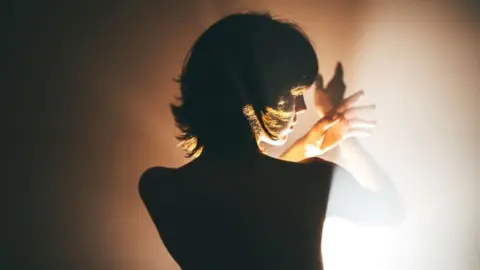Arts body to be 'more cautious' after sex show funding row
 Getty Images
Getty ImagesCreative Scotland has said it will take a "more cautious" approach to funding sexual content after more than £100,000 was spent on a show due to feature real sex.
Chief executive Iain Munro and chairman Robert Wilson said the arts body thought the Rein project would involve simulated sex even though the funding application mentioned genital contact.
Mr Munro told a Holyrood committee that "the mere mention of genital contact does not mean real sex."
The grant was later withdrawn after the the artists advertised for performers to take part in non simulated sex scenes.
He told MSPs that Creative Scotland has since adjusted its application process with anything involving sexual content requiring senior staff and board level approval.
Mr Munro said there was "no mention" of non-simulated sex in the application, despite BBC Scotland News previously discovering the document mentioned "a sex scene with genital contact".
He also denied that the arts body should have "raised eyebrows" over other details in the application, including that it requested performers undergo sexually transmitted infection (STI) tests and that lubricant would be required for the show.
The chief executive said: "Some aspects like STI tests go beyond industry standards and into best practice."
 Google
GoogleWhen questioned by the Conservative MSP Megan Gallacher about lubricant being required and whether this should have indicated scenes would be going beyond simulated sex, Mr Munro said that wasn't Creative Scotland's "reading" of it.
The 45-minute art installation from director Leonie Rae Gasson would have seen people paid £270 per day to take part in sex acts.
Support for the project was axed in March after full details of the installation, described as a "magical erotic journey", were revealed.
Mr Wilson said Creative Scotland "have not misled anyone" but added it would use more caution in future.
He said: "The senior leadership at Creative Scotland, with the support of the board, have reviewed the application process for open funding, and have introduced new safeguards, including an additional stage of review.
"The board has also agreed to a more cautious approach to risk, in terms of our future funding of projects with sexual content and those that involve vulnerable people or children."
'Reputionally damaging'
When questioned by the Labour MSP Neil Bibby about the application describing several sexual acts that would be in the show, Mr Munro replied: "This is a language that is recognised by the queer community and does not provoke them in the way that it does the wider public."
Mr Munro accepted that the incident was "reputationally damaging" and could undermine future investment in Scotland's creative sector.
He added: "This has caught the attention around the world in a way that is not helpful to Scotland...
"[There is]... disbelief that this one such significant award could risk undermining our strong cultural reputation abroad."
Mr Munro said this was the first time concerns had been raised over the funding process but that the controversy "doesn’t indicate systemic failure at the heart of processes."
Mr Wilson said that some of the discussion regarding the Rein project had been "offensive and dangerous", and had included personal attacks on Creative Scotland staff.
Some funding recouped
It was also confirmed that the majority of funding for the project has since been recouped, but around £31,000 will not be recovered.
This includes:
- £8,359 believed to have mostly been spent on freelance workers
- £23,219 of initial funding for research and development awarded last August
The Rein website described the project as a 45-minute art installation with audience interaction showing explicit footage on three large screens emerging from pools of water.
Non-simulated sex scenes would have been filmed in the Highlands for the work.
Mr Wilson described the original application as being for a "challenging, creative ambitious piece of work that spoke to a particular audience more than the mainstream."
He said Creative Scotland would continue to support a broad range of artists and would not serve as an "arbiter of taste" when deciding funding.